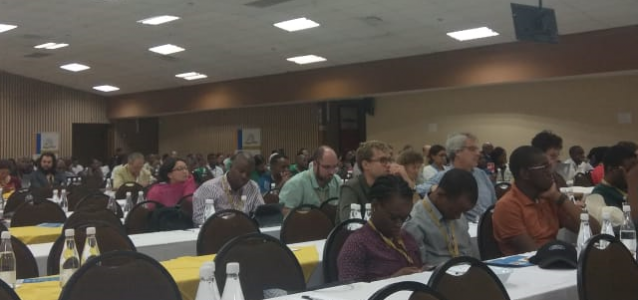By Katinka Lund Waagsaether
Feature image by Ruwadzano Matsika
Attending the 2018 Global Change Conference, which takes place biennially under the banner of the Global Change Grand Challenge of the Department of Science of Technology, gave me a sense of excitement. My excitement came from what seemed to be a somewhat broadening perspective and scope – from the more traditional biophysical science towards the recognition that we need to look beyond this realm to other disciplines, and towards deepening and broadening our commitment to transdisciplinary research.
This sense of excitement was first sparked by the opening guest lecture by Professor Mark Swilling from University of Stellenbosch. Prof Swilling kicked off the conference with arguments around the incompatibility of the neoliberal economic paradigm and a sustainable and just human civilisation, the role of democracy and the energy revolution, and the need for global change research to not just understand change but to also understand the dynamics of the deep, just transition that we need. His input literally blew us all (or at least me and my colleague!) out of our chairs.
On day two, guest lecturer Professor Bagela Chilisa from the University of Botswana provided another inspiring lecture. She highlighted that we are captive within western paradigms, and that we need to appreciate new paradigms rather than inserting indigenous perspectives into these western paradigms. She noted that research is not neutral, and thus the need for methodologies that bring different world views and epistemologies together. Professor Chilisa’s talk highlighted how a broadening of research perspective and scope needs to go beyond the opening to more disciplines and deepening transdisciplinarity. Research perspective and scope also needs to open to a diversity of underlying paradigms.
Further arguing for the need to shift norms and challenge systems, Professor Heila Lotz-Sisitka of Rhodes University highlighted the importance of transformative social learning. In a similar vein, conference co-chair Professor Coleen Vogel emphasised the need for a transformational and transgressive agenda, as well as the importance of engagement, of pausing and reflecting.
However, the excitement sparked by these and a few other speakers has been somewhat short lived. A little post conference digging made me realise that this sense of a broadening perspective and scope was largely the product of these keynote speakers and a few of the conference parallel sessions. It was not the gist of the conference content as a whole. A quick analysis of the conference’s 81 presentation abstracts made me realise that over 50 of these were firmly rooted in the biological and physical sciences. Within the 30 or so remaining, a good majority has a relatively strong land use/agriculture/ natural resource management/ biodiversity/ socio-ecological systems angle, and a mere dozen or so that focus on themes relating to collaborations, partnerships, policy and planning.
Considering the key messages delivered by the speakers, where were the sociology studies that help us understand the development and functioning of human society, as a means to understand and shift the global change trajectory? Where were the political economy studies that help us understand how economic systems, and political paradigms, institutions and environments, are shaping global change? Where were the studies that connect policy, politics and economics with environmental and climatic change? Where were the studies by psychologists, that help us understand the experience and behaviours of individuals or groups, and how this plays into the demands of the human population, into governance systems and economics, into action and inaction?
The definition of global change research, as per the Global Change Grand Challenge National Research Plan, does have a strong emphasis on the biophysical: “Global change refers to an interconnected set of phenomena, resulting largely from human actions which have altered the environment over virtually the entire planet at an accelerating rate during modern times. It includes changes to the composition of the atmosphere; the nutrient loading of the biosphere; the global, regional, and local climate; the distribution and abundance of species; the cover and use of the land surface and the use of marine resources; the size, location, and resource demands of the world’s human population, as well as its patterns of governance and economic activity” (DST, 2009). Despite the definition marginally speaking to aspects beyond the biophysical, it does seem like we are still very much stuck within that traditional biophysical paradigm in the global change research agenda.
And there seems to be a lot happening in that realm. From the research programmes and activities presented by the Southern African Carbon-Climate Observatory (SOCCO), African Earth Observation Network (AEON) and Foundational Biodiversity Information Programme (FBIP), to complex social-ecological systems work of organisations like SANBI, AWARD and Rhodes. As noted by a visiting professor from Norway, in comparison to a country like Norway, with its 5 million inhabitants, a large country like South Africa has such a wealth of institutions and programmes – and thus the privilege of a vast array of knowledge production to draw on. And this means that an array of social sciences researchers, of economists, psychologists, anthropologists and political scientists are out here, in South Africa. They are just not in here, with us, at the Global Change conference.
It is therefore time to open the doors, to make it clear that global change is not just about environmental and atmospheric change and technological innovation – it is also about society, about people, about governance and politics and economics – we need make a dedicated effort to invite these experts to the table, and to ensure that their students do research that becomes part of the global change research agenda.

